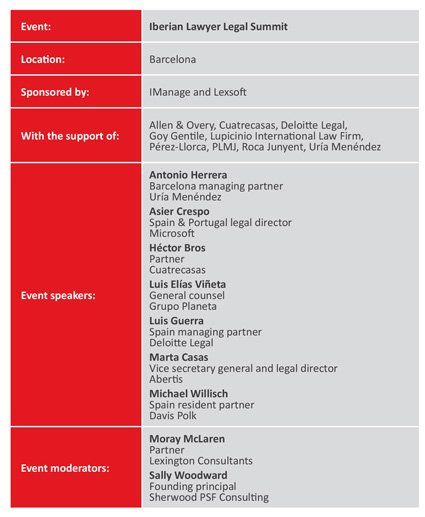Retaining talent ‘biggest issue’ facing legal sector
Motivating and attracting young lawyers – in the face of competition from corporations and hedge funds – can be difficult with the result that the legal sector needs to convince new recruits to buy into its values and philosophy
Retaining and attracting talent is the biggest issue the legal services sector currently faces, according to the conclusions of the recent Iberian Lawyer Legal Summit in Barcelona. Attendees at the event debated the question of whether clients, technology or talent was the biggest challenge facing the sector and identified motivating young lawyers as one of the major difficulties the profession has to overcome.
Participants in the event – which was sponsored by iManage and Lexsoft – heard that members of the newest generation of lawyers do not necessarily have the same career aspirations as their predecessors. For example, it was pointed out that some young lawyers are not driven by the desire to make partner. Furthermore, attendees were told that young lawyers today view older generations in the profession as “slaves”, who spend too much time in the office and too little time with their families.
Shorter-term perspective
Law firms are finding it increasingly difficult to recruit the brightest graduates, attendees heard. Cuatrecasas partner Héctor Bros (pictured left) said that law firms now “face many competitors for talent, including corporations and hedge funds”. Consequently, when attempting to attract young lawyers to your organisation, it is vital that you convince them to buy into its “values and philosophy”, participants were told. It was also concluded that the effect of the changing aspirations of younger lawyers is that, when it comes to careers, they have a shorter-term perspective. Attendees also heard that, while the ‘millennial’ generation are happy to contribute to the success of their law firm, they also expect to have that contribution properly recognised.
New career path
It was also suggested that the legal sector should have a rethink about how it structures the careers of young lawyers. Members of the millennial generation “need a different career path”, remarked one participant. It was also suggested that the legal sector needed more guidance and information about how best to manage and motivate ‘millennial’ lawyers. One attendee summed up the key challenge as how best to “enhance internal motivation”. Succession planning within some in-house legal departments was also raised as an issue with some general counsel facing the problem of having to replace aging teams. 
Reducing legal fees
With regard to the issue of technology, participants were told that clients are using technology to reduce the costs associated with legal services. Michael Willisch (pictured right), the head of Davis Polk’s Madrid office, said that clients are using technology to “better control legal spend and internalise legal services”. This trend is having the effect of reducing legal fees, though attendees heard that clients are prepared to pay higher fees if they perceive they are getting good value. Meanwhile, participants were also told that if law firms use technology to improve the “legal discovery” process, they are then able to reduce prices for clients. However, it was also pointed out that the use of technology also has an impact on law firms’ headcount in the sense that there is a “reduction in the number of the people needed to do the job”.
 Posing risks
Posing risks
Technology can only improve the service provided by lawyers if it is properly harnessed, the event heard. “IT is an opportunity [for lawyers] if they learn how to use it,” said Asier Crespo (pictured left), Spain and Portugal legal director at Microsoft. Meanwhile, other participants argued that artificial intelligence will be useful for law firms in the future as it will allow them to save time.
Yet the greater use of technology will also pose considerable risks for law firms. Participants highlighted that the way in which “technology and regulation intersect” means there are dangers related to the protection of data.
Convincing clients
Other event attendees argued that, while technology is an “important tool”, the real challenges facing law firms are client-related. One participant remarked that one of the biggest issues was how to “convey added value” to in-house legal departments. It was also argued that, in general, there needs to be more communication between lawyers and their clients.
From the clients’ perspective, it was pointed out that some in-house legal departments are now “internalising high-value work” and only going to external counsel for more simple, straightforward matters. “What clients want is value added and secondments,” one participant said.
Watch videos here:
Legal Summit part 1: What are the biggest challenges facing legal services? Clients, Talent or Technology?
Legal Summit part 2: What are the biggest challenges facing legal services? Clients, Talent or Technology?











